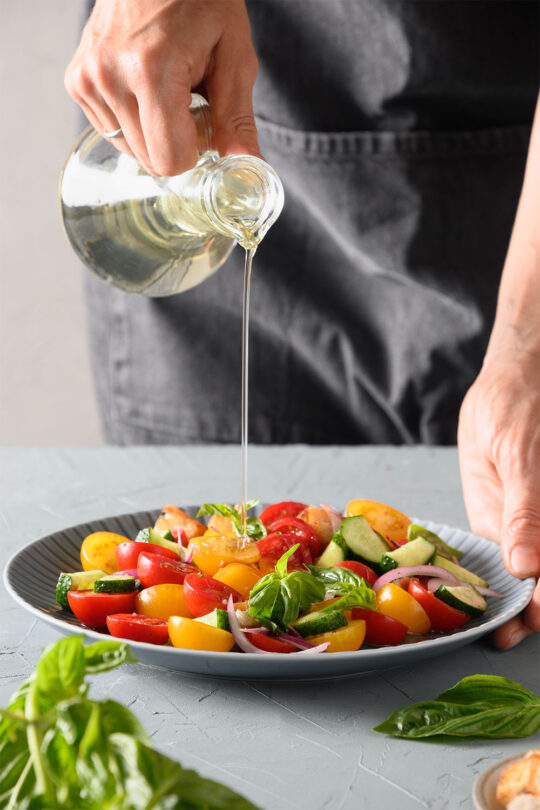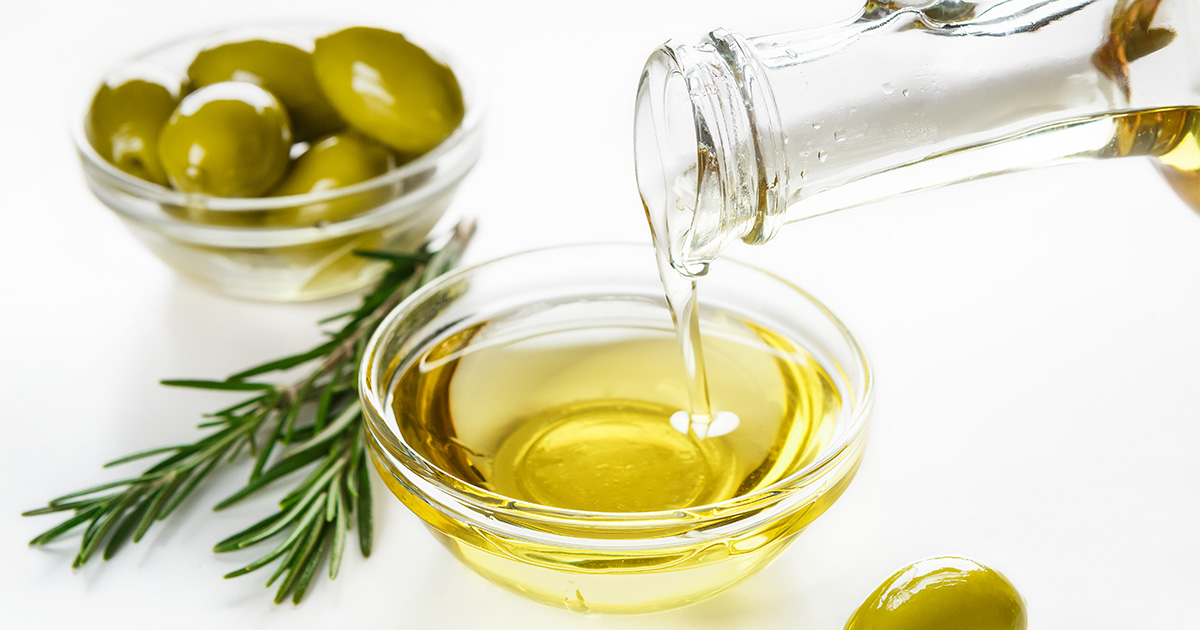Choosing the right type of oil is essential to achieving the right texture and flavor in your edible creations. While olive oil is a popular choice, some recipes call for vegetable oil instead.
But can you substitute vegetable oil for olive oil and vice versa? The short answer is yes, sometimes. Let’s explore the differences between these two types of oil — so you feel comfortable deciding when to use them interchangeably.
Can you substitute vegetable oil for Olive oil?
You can substitute vegetable oil for olive oil in most recipes. However, unrefined and extra virgin olive oils (also known as EVOO) have a stronger flavor and aroma than vegetable oil. If the recipe relies on olive oil for taste, the flavor of your dish may suffer if you swap in vegetable oil.

Vegetable oil vs. Olive oil
What is Olive oil?
Olive oil is a type of vegetable oil made from olives. It has been used for centuries as a cooking oil, dressing, and for medicinal purposes.
There are different types of olive oil, such as light olive oil and EVOO. Light olive oil is a milder-tasting version you can use for searing, sauteing, and even frying — thanks to a neutral taste and high smoke point. EVOO is the highest quality of the oils and has a strong, distinct flavor. It is best used as a finishing oil in salads or cooked dishes, or simply as a dip for breads or vegetables.
All olive oils have health benefits including reducing inflammation, lowering cholesterol levels, and providing antioxidants which can help protect against certain diseases.
What is vegetable oil?
Vegetable oil is a cooking oil made from various plant sources such as olives, avocados, sunflowers, and coconuts. You’ll see vegetable oil as a standard ingredient in baked goods like brownies, cakes, and breads.
You can use it for frying — but you must be careful. The smoke point of vegetable oil is relatively low compared to other oils, meaning it’ll brown and burn if you heat it too high. Stick to shallow frying. Also, see our guide to vegetable oil substitutes for frying.
Vegetable oil has a mild, neutral taste, so it’s appropriate in dishes that need fat without a bunch of added flavor.
The differences between vegetable oil and Olive oil
Olive oil and vegetable oil have some important differences:
- Composition: Vegetable oil is made from various plants. Olive oil is made from olives.
- Taste: Vegetable oil has a neutral flavor. Light olive oils can have a similarly mild flavor, but extra virgin olive oils do not.
- Smoke point: EVOO has a low smoke point of 350 to 410 degrees F (or 177 to 210 degrees C), as reported by oliveoil.com. Vegetable oil’s smoke point is slightly higher, at about 400 degrees F (204 degrees C). Light olive tolerates higher heats, up to about 470 degrees F (or 243 degrees C).
Which is healthier, vegetable oil or Olive oil?
Most experts agree that olive oil is the healthiest choice, as long as you don’t overheat it. (This is why it’s useful to understand smoke points.) Overheated oil oxidizes, which creates harmful compounds.
Olive oil has contains many monounsaturated fats and antioxidants linked to health benefits like lowering cholesterol and improving heart health.
In contrast, vegetable oil is much more processed. Refined vegetable oil makes different oils, including soybean oil, canola oil, corn, and sunflower oil. It does not have the same antioxidant profile as olive oil and may contain added chemicals or additives.
Which tastes better, vegetable oil or Olive oil?

When it comes to taste, the answer is subjective and depends on personal preference. EVOO is known for its distinct flavor that’s essential to Mediterranean cuisine. You might love olive oil or hate it. Vegetable oil, on the other hand, isn’t that distinctive. Most people don’t have an opinion about it, because the flavor is completely neutral.
Will substituting vegetable oil for Olive oil affect the flavor?
Substituting vegetable oil for EVOO will affect the flavor, especially if you’re making a marinade, salad dressing, or a dish that relies on the olive oil taste, such as Chhavi’s olive oil bread dip.
You can more reliably substitute vegetable oil for light olive oil. The flavor will be different, but the change will be more subtle.
Substitution ratio for vegetable oil and Olive oil

When substituting vegetable oil for olive oil, use a 1:1 ratio — so however much olive oil you need, swap in that same amount of vegetable oil.
You can also use a combination of olive oil and vegetable oil. Just keep the total amount of oil the same. So if you need 1 cup of olive oil, you could use ½ cup olive oil plus ½ cup of vegetable oil instead.
Remember that you may need to adjust the cooking time and temperature when you replace vegetable oil with olive oil. Specifically, use lower heats if you’re substituting for light olive oil. You may want to add more seasonings for flavor, too.
Just because you can, does it mean you should?
You can substitute vegetable oil and olive oil, but do you want to? Well, vegetable oil is cheaper than olive oil — so there is a budgeting argument for making the switch. But in terms of flavor and health benefits, olive oil is often a better choice.